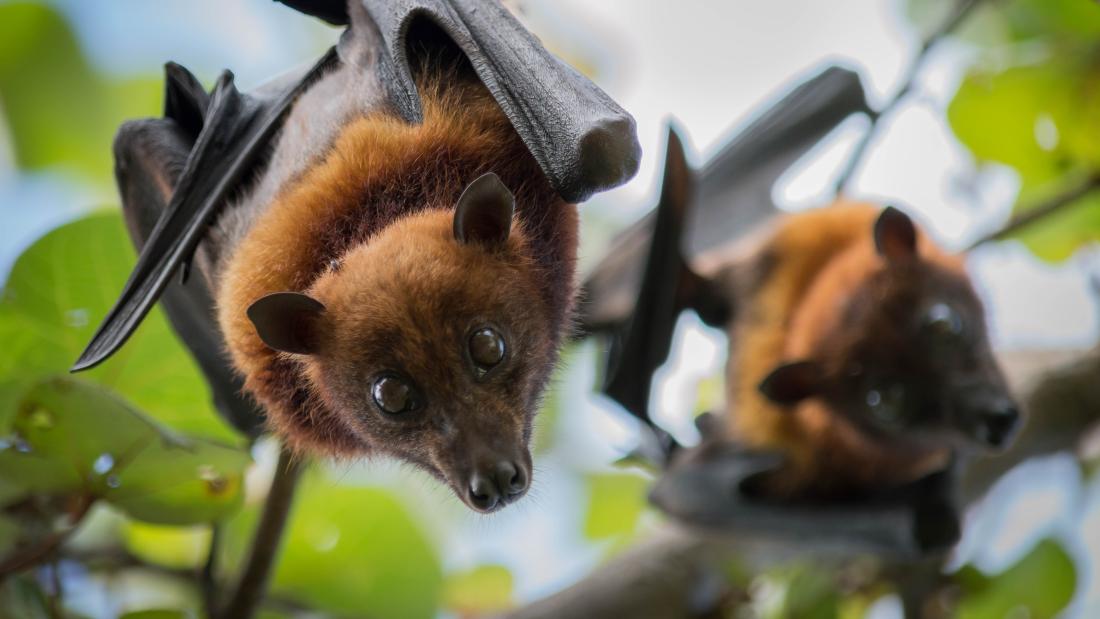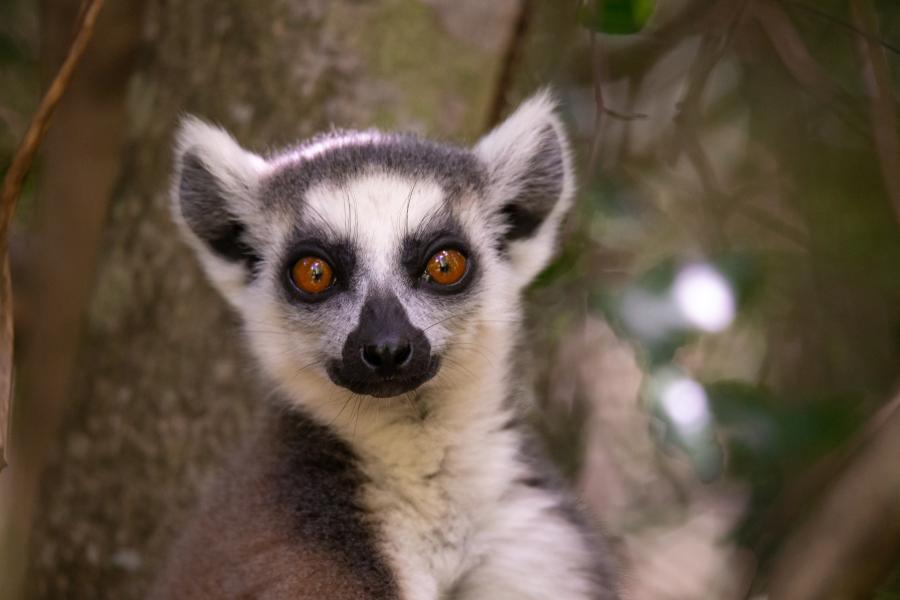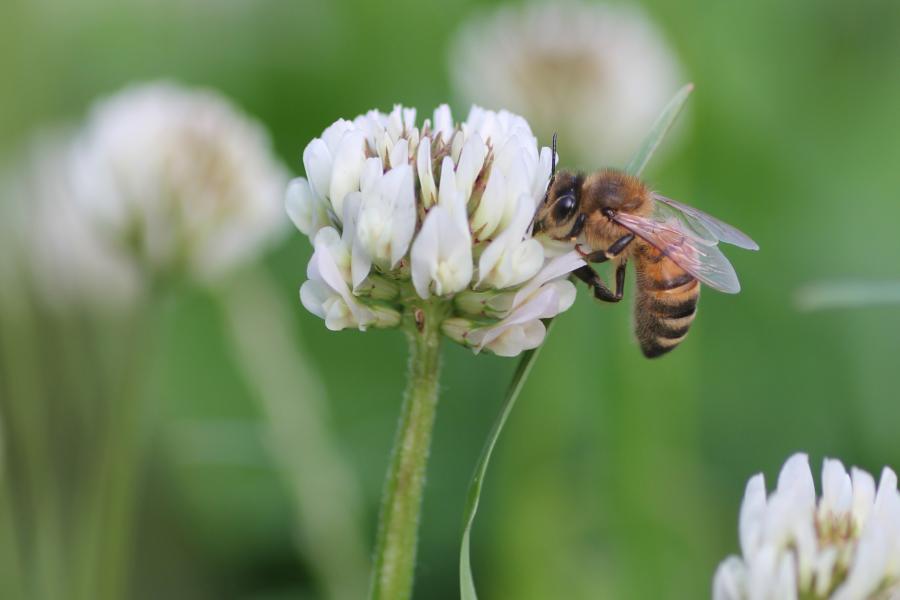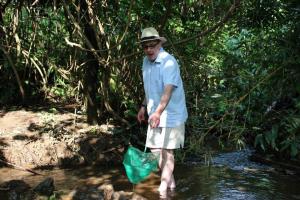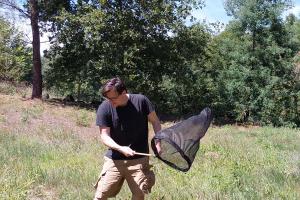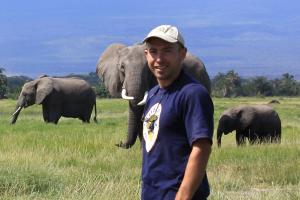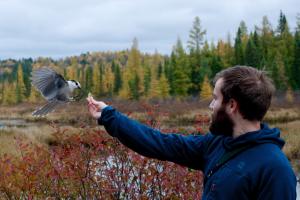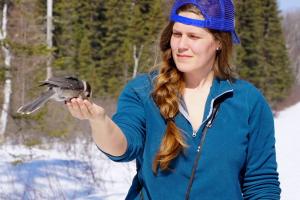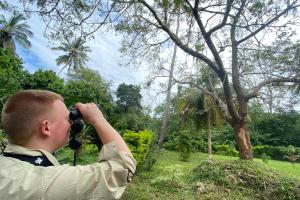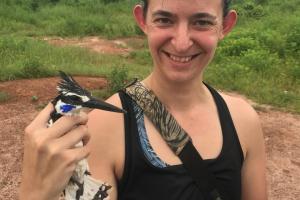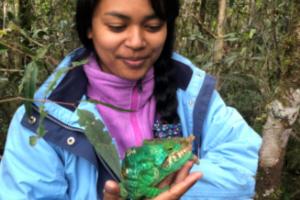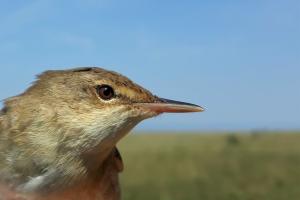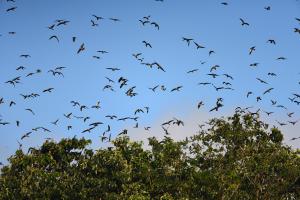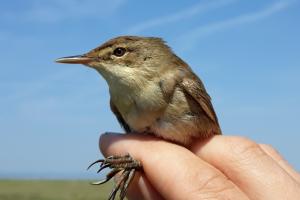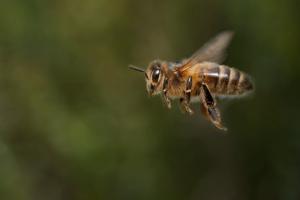Topics we study
Our research topics include:
- the molecular basis of circadian rhythms
- the hormonal control of ecdysis in crustaceans
- the energetics and biomechanics of animal movement
- animal behaviour and ecology
- navigation and migration
- reproductive physiology
- animal personality
- animal social behaviour.
We also work on applied questions such as the effects of anthropogenic disturbance on animals, for example the metabolic and physiological responses to environmental change in marine organisms, the effect of ecotourism and habitat change on stress and reproductive function in primates, and the effect of noise on animal signalling and navigation behaviour.
Meet the Team
Behaviour, Ecology, and Physiology Projects
Our Research Around the World
Recent Publications
A selection of recent publications from Zoology@Bangor researchers is listed here, but for all the latest publications, please check individual researcher pages linked above.
- Widespread extinctions of co-diversified primate gut bacterial symbionts from humans. Sanders, J.G., Sprockett, D.D., Li, Y., Mjungu, D., Lonsdorf, E.V., Ndjango, J.B.N., Georgiev, A.V., Hart, J.A., Sanz, C.M., Morgan, D.B. and Peeters, M., 2023. Nature Microbiology, pp.1-12. https://doi.org/10.1038/s41564-023-01388-w
- Topic sensitivity still affects honest responding, even when specialized questioning techniques are used. Ibbett, H., Dorward, L.J., Kohi, E.M., Jones, J.P., Sankeni, S., Kaduma, J., Mchomvu, J., Mawenya, R. and St. John, F.A., 2023.Conservation Science and Practice, p.e12927. https://doi.org/10.1111/csp2.12927
- Resolving Land Tenure Security Is Essential to Deliver Forest Restoration. Rakotonarivo, O.S., Rakotoarisoa, M., Rajaonarivelo, H.M., Raharijaona, S., Jones, J.P.G., and Hockley, N. 2023.Communications Earth & Environment 4, no. 1, 179. https://doi.org/10.1038/s43247-023-00847-w.
- Introducing a common taxonomy to support learning from failure in conservation. Dickson, I., Butchart, S.H., Catalano, A., Gibbons, D., Jones, J.P., Lee‐Brooks, K., Oldfield, T., Noble, D., Paterson, S., Roy, S. and Semelin, J., 2023. Conservation Biology, 37(1), p.e13967. https://doi.org/10.1111/cobi.13967
- Credit credibility threatens forests. Balmford, A., Brancalion, P.H., Coomes, D., Filewod, B., Groom, B., Guizar-Couti ño, A., Jones, J.P., Keshav, S., Kontoleon, A., Madhavapeddy, A. and Malhi, Y., 2023. Science, 380(6644), pp.466-467. https://doi.org/10.1126/science.adh3426
- Towards a standardized framework for managing lost species. Martin, T.E., Bennett, G.C., Fairbairn, A. and Mooers, A.O., 2023. Animal Conservation, 26(1), pp.29-30. https://doi.org/10.1111/acv.12865
- Applied winter biology: Threats, conservation and management of biological resources during winter in cold climate regions. Reeve, C., Robichaud, J. A., Fernandes, T., Bates, A. E., Bramburger, A. J., Brownscombe, J. W., Davy, C. M., Henry, H. A. L., McMeans, B. C., Moise, E. R. D., Sharma, S., Smith, P. A., Studd, E. K., O’Sullivan, A., Sutton, A. O., Templer, P. H., & Cooke, S. J. 2023. Conservation Physiology, 11(1), coad027. https://doi.org/10.1093/conphys/coad027
- Impacts of herbivory by ecological replacements on an island ecosystem. JMoorhouse‐Gann, R.J., Vaughan, I.P., Cole, N.C., Goder, M., Tatayah, V., Jones, C.G., Mike, D., Young, R.P., Bruford, M.W., Rivers, M.C. and Hipperson, H., 2022. ournal of Applied Ecology, 59(9), pp.2245-2261. https://doi.org/10.1111/1365-2664.14096
- Rewilding—The farmers’ perspective. Perceptions and attitudinal support for rewilding among the English farming community. Mikołajczak, K.M., Jones, N., Sandom, C.J., Wynne‐Jones, S., Beardsall, A., Burgelman, S., Ellam, L. and Wheeler, H.C., 2022. People and Nature, 4(6), pp.1435-1449. https://doi.org/10.1002/pan3.10376
- Impact of landscape configuration and composition on pollinator communities across different European biogeographic regions. Bottero, I., Dominik, C., Schweiger, O., Albrecht, M., Attridge, E., Brown, M.J.F., Cini, E., Costa, C., De la Rúa, P., de Miranda, J.R., Di Prisco, G., Dzul Uuh, D., Hodge, S., Ivarsson, K., Knauer, A.C., Klein, A.-M., Mänd, M., Martínez-López, V., Medrzycki, P., Pereira-Peixoto, H., Potts, S., Raimets, R., Rundlöf, M., Schwarz, J.M., Senapathi, D., Tamburini, G., Talaván, E.T., Stout, J.C., 2023. Frontiers in Ecology and Evolution 11. https://doi.org/10.3389/fevo.2023.1128228
- Small effects of family size on sociality despite strong kin preferences in female bottlenose dolphins. Foroughirad, V., Frère, C.H., Levengood, A.L., Kopps, A.M., Krzyszczyk, E. and Mann, J., 2023. Animal Behaviour, 195, pp.53-66. https://doi.org/10.1016/j.anbehav.2022.10.011
- Model ensembles of ecosystem services fill global certainty and capacity gaps. Willcock, S., Hooftman, D.A., Neugarten, R.A., Chaplin-Kramer, R., Barredo, J.I., Hickler, T., Kindermann, G., Lewis, A.R., Lindeskog, M., Martínez-López, J. and Bullock, J.M., 2023. Science Advances, 9(14), p.eadf5492. https://doi.org/10.1126/sciadv.adf5492
- Differential effects of vegetation and climate on termite diversity and damage. Wu, D., Seibold, S., Ellwood, M.F. and Chu, C., 2022. Journal of Applied Ecology, 59(12), pp.2922-2935. https://doi-org.bangor.idm.oclc.org/10.1111/1365-2664.14282
- The effects of population management on wild ungulates: A systematic map of evidence for UK species. Barton, O., Gresham, A., Healey, J.R., Cordes, L.S. and Shannon, G., 2022. Plos one, 17(6), p.e0267385. https://doi.org/10.1371/journal.pone.0267385
- Gas compressor noise does not influence tree swallow nestling condition or immune response. JMacLeod, K.J., Naugle, L., Brittingham, M.C. and Avery, J.D., 2022. ournal of Zoology, 318(1), pp.1-9. https://doi.org/10.1111/jzo.12997
- Widespread variation in functional trait–vital rate relationships in tropical tree seedlings across a precipitation and soil phosphorus gradient. Browne, L., Markesteijn, L., Manzané‐Pinzón, E., Wright, S.J., Bagchi, R., Engelbrecht, B.M., Jones, F.A. and Comita, L.S., 2023. Functional Ecology, 37(2), pp.248-260. https://doi.org/10.1111/1365-2435.1421
- On track to achieve no net loss of forest at Madagascar’s biggest mine. Devenish, K., Desbureaux, S., Willcock, S., & Jones, J. P. G. (2022). Nature Sustainability, 5(6), 498–508. https://doi.org/10.1038/s41893-022-00850-7
Latest News
See MoreOpportunities
Behaviour, Ecology, and Physiology researchers supervise PhD researchers through the Envision Doctoral Training Partnership, funded by the Natural Environment Research Council (NERC).
If you are interested in completing postgraduate research (MRes or PhD) with us, whether through Envision or an alternative route, please contact individual staff members to discuss.

